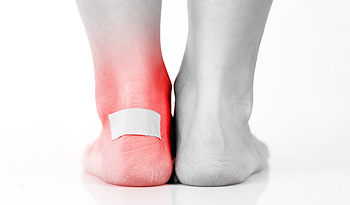NJ (908) 688-5577
NY (212) 737-2528
 People who enjoy running can experience blisters. It is the body’s method of protecting skin that has become damaged from excessive friction. It appears as a bubble that is filled with liquid which forms over the raw skin, and it will gradually drain as new skin develops. It is beneficial to wear a protective covering over the blister while running, and this may help to prevent the blister from popping or draining prematurely. Common symptoms of an infected blister can consist of swelling, redness, and there may be a yellowish fluid that comes from the blister. Effective preventive methods can include wearing shoes and socks that fit correctly, and it may help to improve balance which can affect stability. If you would like additional information about blisters on the feet, please confer with a podiatrist.
People who enjoy running can experience blisters. It is the body’s method of protecting skin that has become damaged from excessive friction. It appears as a bubble that is filled with liquid which forms over the raw skin, and it will gradually drain as new skin develops. It is beneficial to wear a protective covering over the blister while running, and this may help to prevent the blister from popping or draining prematurely. Common symptoms of an infected blister can consist of swelling, redness, and there may be a yellowish fluid that comes from the blister. Effective preventive methods can include wearing shoes and socks that fit correctly, and it may help to improve balance which can affect stability. If you would like additional information about blisters on the feet, please confer with a podiatrist.
Blisters are prone to making everyday activities extremely uncomfortable. If your feet are hurting, contact Glenn Davison, DPM of Advanced Podiatry. Our doctor can provide the care you need to keep you pain-free and on your feet.
Foot Blisters
Foot blisters develop as a result of constantly wearing tight or ill-fitting footwear. This happens due to the constant rubbing from the shoe, which can often lead to pain.
What Are Foot Blisters?
A foot blister is a small fluid-filled pocket that forms on the upper-most layer of the skin. Blisters are filled with clear fluid and can lead to blood drainage or pus if the area becomes infected.
How Do Blisters Form?
Blisters on the feet are often the result of constant friction of skin and material, usually by shoe rubbing. Walking in sandals, boots, or shoes that don’t fit properly for long periods of time can result in a blister. Having consistent foot moisture and humidity can easily lead to blister formation.
Prevention & Treatment
It is important to properly care for the affected area in order to prevent infection and ease the pain. Do not lance the blister and use a Band-Aid to provide pain relief. Also, be sure to keep your feet dry and wear proper fitting shoes. If you see blood or pus in a blister, seek assistance from a podiatrist.
If you have any questions, please feel free to contact our offices located in Union, NJ and New York . We offer the newest diagnostic and treatment technologies for all your foot care needs.